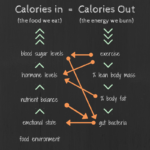How Sleep Fuels Fat Loss and Muscle Recovery?
We all know sleep is important for our overall health, but did you know it plays a crucial role in your fitness goals too? When it comes to fat loss and muscle recovery, prioritizing sleep is just as important as diet and exercise. Let’s delve into the science behind sleep and how it impacts your weight loss journey and muscle-building efforts.
Sleep and Fat Loss: A Powerful Partnership
Studies have shown a clear connection between sleep deprivation and weight gain. Here’s how sleep can help you torch fat:
- Hormonal Harmony: During sleep, your body regulates hormones like leptin (promotes satiety) and ghrelin (stimulates hunger). When sleep-deprived, leptin levels decrease, and ghrelin levels rise, making you feel hungrier and more likely to overeat.
- Metabolic Boost: Sleep is essential for proper metabolic function. Lack of sleep can disrupt how your body processes insulin, leading to increased blood sugar levels and potentially hindering weight loss.
- Craving Control: Sleep deprivation can increase cortisol, a stress hormone that can trigger cravings for sugary and fatty foods, derailing your weight loss efforts.
- Energy for Exercise: Adequate sleep fuels your workouts. Feeling tired can make it harder to exercise consistently and with intensity, hindering your calorie-burning potential.
Sleep and Muscle Recovery: Building a Stronger You
Sleep isn’t just about burning fat; it’s vital for building and repairing muscle tissue. Here’s why:
- Growth Hormone Powerhouse: During deep sleep, your body releases growth hormone, which plays a key role in muscle growth and repair. When sleep-deprived, growth hormone production dips, hindering muscle development.
- Muscle Protein Synthesis: Sleep is when your body actively repairs and rebuilds muscle tissue broken down during exercise. Insufficient sleep can impair muscle protein synthesis, leading to decreased muscle mass.
- Reduced Muscle Breakdown: Cortisol, again, plays a negative role. Elevated cortisol levels from sleep deprivation can promote muscle breakdown, negating your gym efforts.
How Much Sleep Do You Need?
The National Sleep Foundation recommends 7-9 hours of sleep for adults. However, individual needs may vary. Listen to your body and prioritize quality sleep over quantity. Here are some tips for a good night’s rest:
- Create a Sleep Schedule: Go to bed and wake up at consistent times, even on weekends, to regulate your body’s natural sleep-wake cycle.
- Relaxing Bedtime Routine: Develop a calming routine before bed, such as taking a warm bath, reading a book, or practicing relaxation techniques like deep breathing or meditation.
- Optimize Your Sleep Environment: Make sure your bedroom is dark, quiet, cool, and clutter-free to promote better sleep.
- Limit Screen Time Before Bed: The blue light emitted from electronic devices can disrupt sleep patterns. Avoid screens for at least an hour before bedtime.
- Regular Exercise: Regular physical activity can improve sleep quality, but avoid strenuous workouts too close to bedtime.
The Domino Effect of Sleep Deprivation: How It Impacts Your Fitness Journey
Sleep deprivation isn’t just about feeling tired. It has a ripple effect that can negatively impact various aspects of your fitness journey. Here’s how:
- Reduced Motivation: When sleep-deprived, you’re more likely to feel sluggish and lack the motivation to hit the gym or stick to a healthy meal plan.
- Increased Injury Risk: Fatigue can impair coordination and reaction time, putting you at a higher risk of exercise injuries.
- Compromised Immunity: Sleep is crucial for a healthy immune system. When sleep-deprived, your body is less equipped to fight off illness, potentially causing setbacks in your workout routine.
- Cognitive Decline: Sleep is essential for cognitive function. Lack of sleep can impair focus, concentration, and decision-making, making it harder to perform optimally during workouts or adhere to complex fitness plans.
Conclusion: Sleep for Success
Prioritizing sleep is a non-negotiable for anyone serious about fat loss and muscle gain. By ensuring you get enough quality sleep each night, you’re setting your body up for success. You’ll have more energy for exercise, make healthier food choices, optimize hormone function, and allow your muscles to recover and grow. So, ditch the all-nighters and embrace the power of sleep. Your body and your fitness goals will thank you for it!








